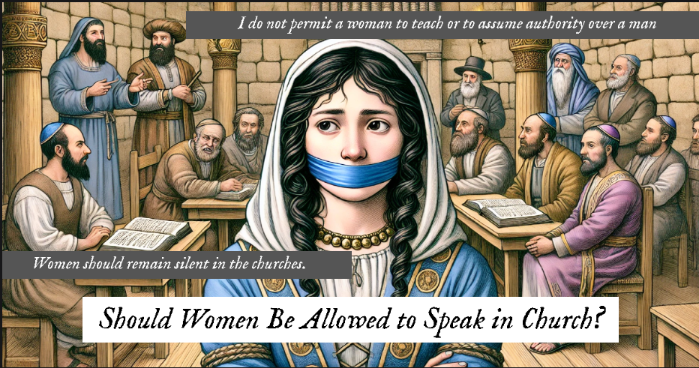For centuries, women have been told to keep silent in church—but is that really what the Bible teaches? The debate over whether women can preach, teach, or even speak at all in church comes straight from the Apostle Paul’s writings, yet many scholars argue that these passages may not even be authentic. Meanwhile, early Christian texts like The Acts of Paul and Thecla paint a radically different picture. So, what does the Bible really say?
Paul’s Controversial Command: Silence Women in Church?
The most infamous passage used to silence women in church is 1 Corinthians 14:34-35:
“Women should remain silent in the churches. They are not allowed to speak, but must be in submission, as the law says. If they want to inquire about something, they should ask their own husbands at home; for it is disgraceful for a woman to speak in the church.”
This is one of the strongest biblical arguments against women preaching. However, there’s a huge problem—many scholars believe Paul didn’t even write these verses!
Did Paul Actually Write 1 Corinthians 14:34-35?
Evidence suggests this passage was a later insertion:
- It disrupts the flow of Paul’s argument—if you remove it, the passage reads more smoothly.
- Some ancient manuscripts place these verses in different locations, suggesting they were added later.
- Paul contradicts himself—in 1 Corinthians 11:5, he acknowledges that women do prophesy in church. Why would he suddenly forbid it?
Paul’s Other Anti-Woman Statement
Another controversial passage is 1 Timothy 2:11-12:
“A woman should learn in quietness and full submission. I do not permit a woman to teach or to assume authority over a man; she must be quiet.”
This passage seems clear-cut—until you realize Paul probably didn’t write it.
- Most scholars believe 1 Timothy was written by a later follower of Paul, not Paul himself.
- The Greek words used for “authority” (authentein) are unique and unclear, meaning the passage could be misinterpreted.
- Paul’s authentic letters show women as leaders—like Phoebe the deacon (Romans 16:1) and Junia the apostle (Romans 16:7).
If Paul himself supported female church leaders, then whoever wrote 1 Timothy was rewriting history.
The Acts of Paul and Thecla: A Different Story
While the New Testament seems to limit women, early Christian writings tell a very different story.
The Acts of Paul and Thecla (a 2nd-century text) describes Thecla, a woman who becomes a preacher and evangelist, defying social norms. According to this story:
- Paul teaches Thecla, who baptizes herself and preaches publicly.
- Paul endorses her ministry, proving that women had active roles in the early church.
- The early church rejected this text, likely because it gave too much power to women.

The Acts of Paul and Thecla is an early Christian apocryphal text that tells the story of Thecla, a noblewoman from Iconium who becomes a devoted follower of Paul. After hearing Paul preach about celibacy and devotion to God, she rejects her fiancé and chooses a life of chastity, which enrages her family and local authorities. She is sentenced to be burned at the stake, but a miraculous storm extinguishes the flames. Later, she is thrown to wild beasts in the arena, but they refuse to harm her. Through divine intervention, she repeatedly escapes execution and ultimately baptizes herself in a pool of water filled with ravenous seals before dedicating her life to preaching the gospel. The story portrays Thecla as a bold, miracle-working woman, challenging traditional gender roles and emphasizing divine protection for those who devote themselves to Christ.
Several early Christian sects and church leaders sought to suppress women’s roles in leadership and condemn the Acts of Paul and Thecla as heretical, particularly those aligned with the emerging orthodox, patriarchal church structure in the 2nd–4th centuries. Here are some key groups and figures involved in this suppression:
As Christianity developed, proto-orthodox leaders like Tertullian (c. 200 AD) attacked the Acts of Paul and Thecla, calling it a fraudulent text that encouraged women to defy male authority. He mocked its story of Thecla baptizing herself and declared that women had no right to baptize or preach.
The Pastoral Epistles (1 & 2 Timothy, Titus)—likely written after Paul’s death—strongly reinforced male leadership and were used to push back against traditions that allowed women to preach. 1 Timothy 2:12 explicitly forbids women from teaching, contradicting stories like Thecla’s.
Many Gnostic sects supported female leadership, and some even revered Thecla as an apostle. However, as proto-orthodox Christianity gained power, they declared these groups heretical. Church leaders like Irenaeus and Hippolytus condemned Gnostic texts that elevated women.
While not part of the Bible, The Acts of Paul and Thecla shows that early Christian communities had female leaders, contradicting later church doctrines that silenced them.
The Real Truth: Women Were Leaders in Early Christianity
- Paul himself recognized female leaders (Romans 16).
- Later writings (like 1 Timothy) may have distorted Paul’s real views.
- The early church had female preachers, but history erased them.
Conclusion: Should Women Speak in Church?
If you go strictly by the Bible’s earliest writings, women were never meant to be silent. The idea that women shouldn’t speak in church comes from later distortions—not the true message of early Christianity.
The real question isn’t whether women should speak in church. It’s why we’ve spent 2,000 years trying to silence them.
Sources
- Bart Ehrman – Forgery and Counterforgery
- Richard Elliott Friedman – Who Wrote the Bible?
- Elaine Pagels – The Gnostic Gospels
- Karen King – The Gospel of Mary of Magdala
- Wayne Meeks – The First Urban Christians
- Ben Witherington – Women in the Earliest Churches
This post contains affiliate links. As an Amazon Associate, I earn from qualifying purchases at no extra cost to you.

